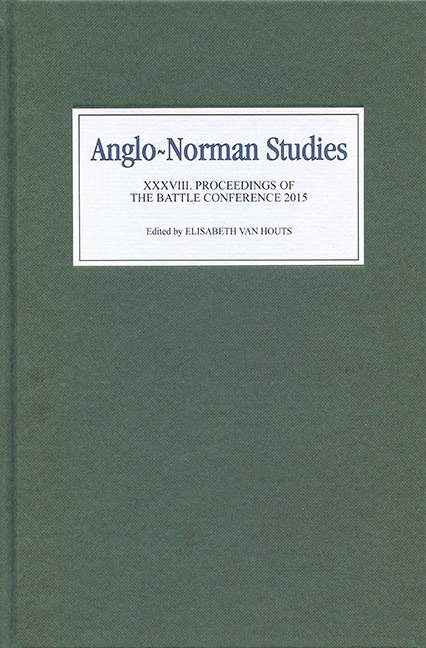Book contents
- Frontmatter
- Contents
- Illustrations and Tables
- Editor's Preface
- Abbreviations
- From the Articles of the Barons to Magna Carta (The R. Allen Brown Memorial Lecture, 2015)
- Jews in the Glosses of a Late Twelfth-Century Anglo-Norman Gratian Manuscript (Cambridge, Gonville and Caius College, MS 283/676)
- Monastic Autonomy, Episcopal Authority and the Norman Conquest: The Records of Barking Abbey (The Marjorie Chibnall Memorial Essay, 2015)
- Economy Distorted, Economy Restored: Order, Economy and Salvation in Anglo-Norman Monastic Writing
- Monastic Patronage and Family Disputes in Eleventh- and Early Twelfth-Century Normandy
- Constance, Princess of Antioch (1130–1164): Ancestry, Marriages and Family
- Early Aristocratic Seals: An Anglo-Norman Success Story
- English Towns and Urban Society after the Norman Conquest
- Wreck of the Sea in Law and Practice in Eleventh- and Twelfth-Century England
- Social Life and Religious Culture in Twelfth-Century Norwich and Norfolk
- Bad Crusaders? The Normans of Southern Italy and the Crusading Movement in the Twelfth Century
- Turold, Wadard and Vitalis: Why Are They on the Bayeux Tapestry?
Monastic Patronage and Family Disputes in Eleventh- and Early Twelfth-Century Normandy
Published online by Cambridge University Press: 12 September 2017
- Frontmatter
- Contents
- Illustrations and Tables
- Editor's Preface
- Abbreviations
- From the Articles of the Barons to Magna Carta (The R. Allen Brown Memorial Lecture, 2015)
- Jews in the Glosses of a Late Twelfth-Century Anglo-Norman Gratian Manuscript (Cambridge, Gonville and Caius College, MS 283/676)
- Monastic Autonomy, Episcopal Authority and the Norman Conquest: The Records of Barking Abbey (The Marjorie Chibnall Memorial Essay, 2015)
- Economy Distorted, Economy Restored: Order, Economy and Salvation in Anglo-Norman Monastic Writing
- Monastic Patronage and Family Disputes in Eleventh- and Early Twelfth-Century Normandy
- Constance, Princess of Antioch (1130–1164): Ancestry, Marriages and Family
- Early Aristocratic Seals: An Anglo-Norman Success Story
- English Towns and Urban Society after the Norman Conquest
- Wreck of the Sea in Law and Practice in Eleventh- and Twelfth-Century England
- Social Life and Religious Culture in Twelfth-Century Norwich and Norfolk
- Bad Crusaders? The Normans of Southern Italy and the Crusading Movement in the Twelfth Century
- Turold, Wadard and Vitalis: Why Are They on the Bayeux Tapestry?
Summary
In 1113, Henry I, king of England and duke of Normandy, visited the monastery of Saint-Evroul in southern Normandy. While there, a charter of Saint- Evroul's possessions was drawn up, which Henry later confirmed. According to Orderic Vitalis, the monastery's resident historian and witness to Henry's visit, the charter was ‘made on the advice of prudent men as a protection against greedy heirs, who every year used to take back alms given by their relatives, and constantly dragged monks into lawsuits to the great diminution of the goods of churches’. These complaints are not uncommon; we can compare the comments of Guibert of Nogent, lamenting the disrespect shown by heirs to the ecclesiastical endowments of their predecessors: ‘For now, alas, those gifts which their parents, moved with the love of such things, made to the holy places, the sons now withdraw entirely or continually demand payment for their renewal, having utterly degenerated from the good will of their sires.’
The practice of monastic patronage by laymen could attract significant protest from family members of the granter, who stood to lose out from his generosity to the Church. This is an interesting and revealing phenomenon, which deserves more scholarly attention than it has so far received. My aim here is to use these cases from the eleventh and early twelfth centuries to consider what insights they can give us into conflict within families at this time. First, I consider perceptions of monastic patronage and the role of the family, looking particularly at the dilemma faced by lay landholders: whether to provide alms to the Church or to provide an inheritance for heirs. Secondly, I look at Norman inheritance custom during the eleventh and early twelfth centuries, before thirdly considering cases of family disputes over monastic patronage to see what can be gleaned of secular familial conflict. I argue that the fluidity and multiplicity of Norman inheritance custom facilitated the disputation of family members’ monastic patronage. The seizing or claiming of land which had previously been alienated to the Church was often part of the process of succession and familial reshuffling which took place after the death of a lay lord.
- Type
- Chapter
- Information
- Anglo-Norman Studies XXXVIIIProceedings of the Battle Conference 2015, pp. 67 - 80Publisher: Boydell & BrewerPrint publication year: 2016



